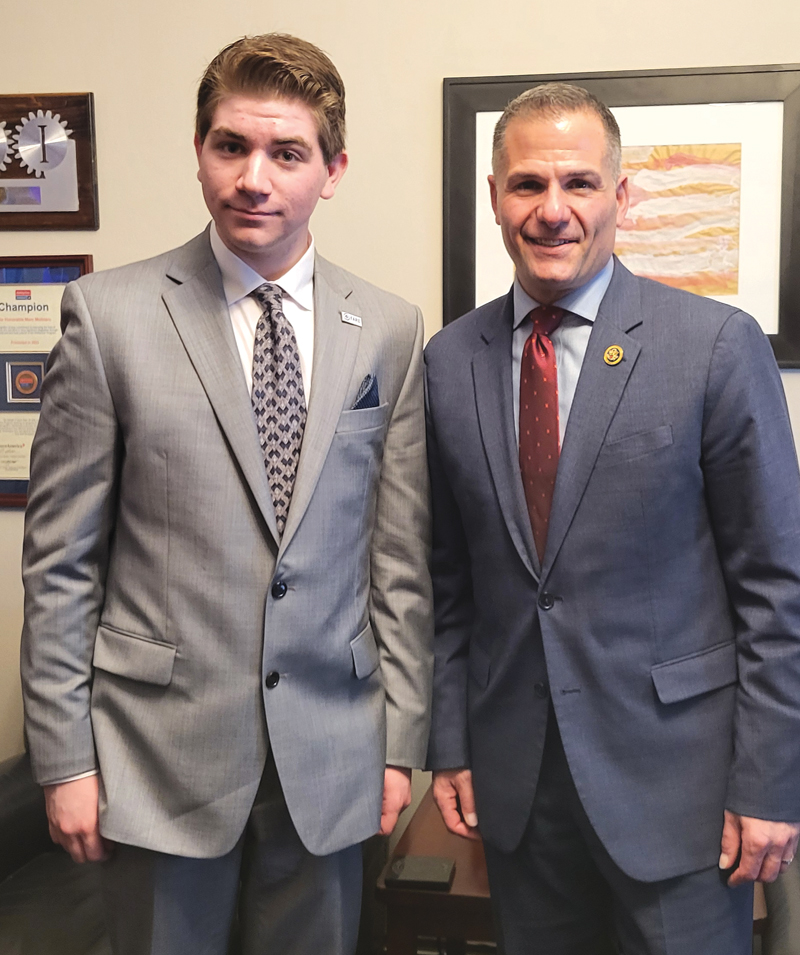
Local Teen Reports on Trip to U.S. Capitol for Allergy Fly-In
By MONICA CALZOLARI
ONEONTA
Devin Sailer, age 16, recalls going to the emergency room once a month as a child. He has 31 allergies, any one of which can be fatal.
Sailer was one of more than 170 advocates making their voices heard at FARE’s Courage at Congress 2024: Advocate for a Cure legislative fly-in, March 4-6.
FARE stands for Food Allergy Research & Education. It is the leading non-profit in the U.S. engaged in food allergy advocacy and the largest private funder of food allergy research.
Sailer is an active member of this organization. FARE has organized this event annually for the past five years. The 2024 fly-in was the largest one to date.
Sailer had to apply for this opportunity, was chosen and received a stipend to help with expenses. He took three days off from Oneonta High School and flew to Washington, D.C. to visit the Capitol and meet New York State representatives. Frances Sailer, his mother, accompanied him on the trip.
One of his goals for this trip was to meet Congressman Marc Molinaro, the U.S. representative for New York’s District 19, which includes part of Otsego County.
Sailer explained that advocates from 42 states were divided up by state and met with 41 elected officials.
He said, “I did not meet many young people like myself. It was mostly adults at this event.”
“We are very honored to have the opportunity to meet Congressman Molinaro in person. Our visit took place just three days before the State of the Union address. The congressmen were very busy,” Sailer said.
Sailer and the New York State delegation were given a tour of Congress by Paul Tonko’s office. Tonko is the U.S. representative for New York’s 20th congressional district since 2013. He serves the Capital region. Sailer called Tonko a “staunch ally” of the allergy community. Tonko is a member of the Food Allergy Research Caucus.
Sailer said, “We got to see the effects of January 6 and all the increased security in place.”
The New York delegation also met Michael Lawler, who is the U.S. representative for New York’s 17th congressional district since 2023.
Sailer said, “He represents Putnam County, closer to Yonkers and New York City.”
Sailer also met with a representative from the office of Kirsten Gillibrand. Gillibrand is a United States senator from New York since 2009.
The three main legislative priorities highlighted by FARE during this two-day event were:
- Cosponsor ADINA Act
- Cosponsor Dillon’s Law
- Introduce/cosponsor the EPIPEN Act
ADINA stands for Allergen Disclosure in Non-Food Articles. The bill is named after Adina Togal, who almost died from an allergic reaction after taking an antibiotic that contained an unlisted allergen and gluten.
This bill points out that “in 2019, an 11-year-old California girl died after brushing her teeth with a prescription toothpaste that contained dairy.” If passed, the ADINA Act would require labeling of prescription and over-the-counter drugs with the top nine allergens and gluten.
Congressmen Lawler and Tonko have cosponsored this bill. Sailer asked that Molinaro cosponsor it, too, and encouraged him to become a member of the Congressional Food Allergy Research Caucus like Congressman Tonko. Molinaro promised to read the bills related to food allergies that his constituents brought to his attention.
Dillon’s Law is named after Dillon Mueller, a teenager from Wisconsin who passed away due to an anaphylactic attack following a bee sting. This bill creates an incentive to encourage states to allow trained individuals to carry and administer an epinephrine auto-injector to someone who is suffering from an allergic reaction.
Sailer is allergic to bees and carries an EpiPen. He said, “This is commonsense legislation. It will save lives.”
The EPIPEN Act stands for “Epinephrine’s Pharma Inflated Price Ends Now.” This legislation would impose a $60.00 cap on every two-pack of epinephrine auto-injectors sold in the U.S. Currently, the cost of the brand name EpiPen ranges from $650.00-$730.00, depending on the pharmacy.
Sailer explained, “Research shows that it costs pharmaceutical companies about $8.00 for each EpiPen they manufacture, about $7.00 for the injector and $1.00 worth of medicine inside. Yet, companies charge $650.00 for a pack of two!”
The EPIPEN bill states that “ephinephrine is the only way to manage an anaphylactic attack.” By having a monopoly on this branded product, pharmaceutical companies have driven up the price “more than 400% since 2007.”
High-deductible health care plans have “increased nationally by 83.7% over the last ten years,” according to the bill. An EpiPen may be an out-of-pocket expense for many of the 33 million individuals in the U.S. who suffer from life-threatening allergies.
FARE estimates that “the average family spends more than $4,000 a year in costs for each food allergic child.”
FARE’s message to Congress about capping the cost of EpiPens is simple: “Life-saving medicine shouldn’t cost more than a car payment or your mortgage.”
According to FARE’s website and research, “about two children in every classroom” suffer from food allergies.
Referring to herself and her son, Frances Sailer said, “We have been advocates for legislation that fundamentally impacts the allergic community for many years, starting in 2010.”
Going to Washington, D.C. and learning about the congressional process of how state bills and house bills need to be sponsored, voted on, and passed has made Sailer more interested in politics.
Sailer said, “On May 14, 2024, I will be going to Albany to advocate for state legislation related to individuals afflicted with allergies.”
He said, “I have considered studying law to defend the rights of individuals with allergies. Now I am thinking that I can help a lot more people with allergies as a politician.”

